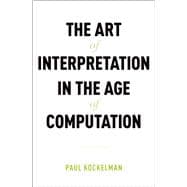This book is about media, mediation, and meaning. The Art of Interpretation focuses on a set of interrelated processes whereby ostensibly human-specific modes of meaning become automated by machines, formatted by protocols, and networked by infrastructures. That is, as computation replaces interpretation, information effaces meaning, and infrastructure displaces interaction. Or so it seems.
Paul Kockelman asks: What does it take to automate, format, and network meaningful practices? What difference does this make for those who engage in such practices? And what is at stake? Reciprocally: How can we better understand computational processes from the standpoint of meaningful practices? How can we leverage such processes to better understand such practices? And what lies in wait? In answering these questions, Kockelman stays very close to fundamental concerns of computer science that emerged in the first half of the twentieth-century. Rather than foreground the latest application, technology or interface, he accounts for processes that underlie each and every digital technology deployed today.
In a novel method, The Art of Interpretation leverages key ideas of American pragmatism-a philosophical stance that understands the world, and our relation to it, in a way that avoids many of the conundrums and criticisms of conventional twentieth-century social theory. It puts this stance in dialogue with certain currents, and key texts, in anthropology and linguistics, science and technology studies, critical theory, computer science, and media studies.








